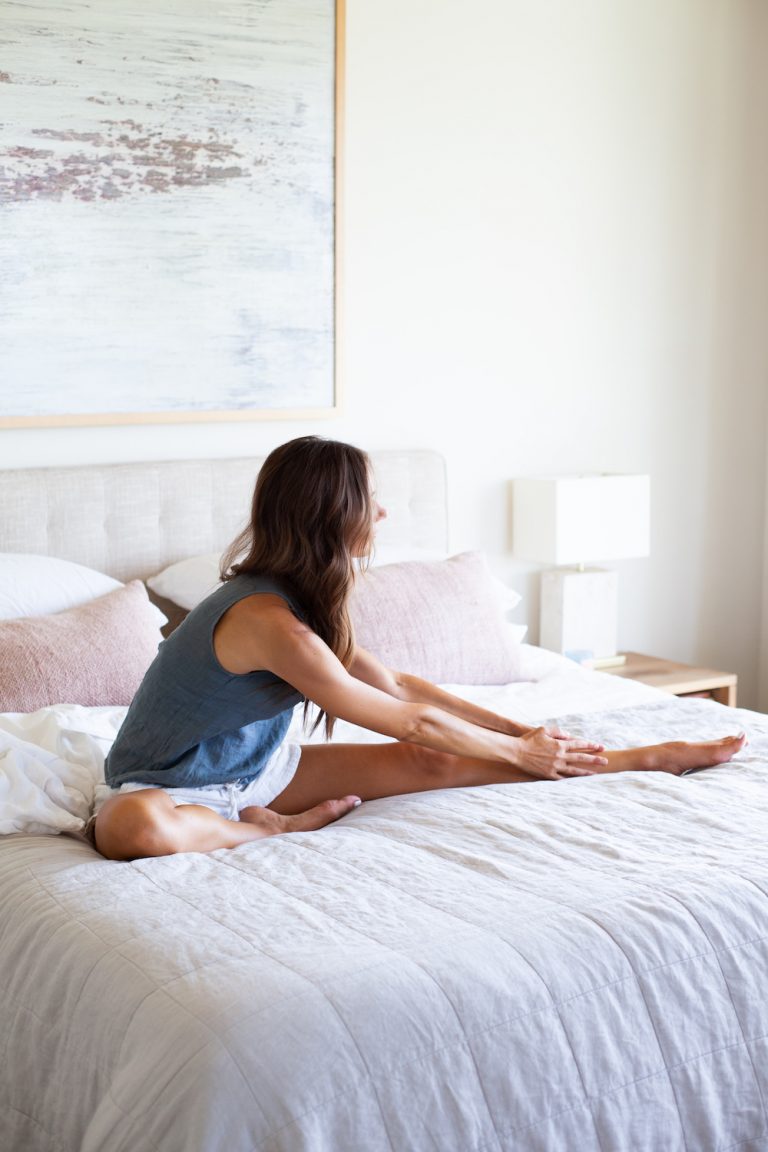[ad_1]
In the real-life world of sex, getting in the mood isn’t always as easy as it looks on Netflix (not unlike most things.) A once totally killer sex life may now mysteriously be gone, (or perhaps has slowly snuck faded for reasons unknown) which is why it can be helpful to know how to increase your libido.
First things first: you should know it’s not necessarily a secret signal from your body that your relationship is doomed.
We can be content in a great relationship and happy with our life in general—yet find ourselves wondering why we’re never in the mood anymore. And though it’s a subject we rarely talk about or share with others, it’s actually quite common. So if you find yourself here, just know: it’s normal, healthy, and totally okay. Let’s dig into what may be going on and figure out how to increase your libido.

What’s “normal” when it comes to my libido?
Each person’s sex drive is as different as we are all unique in this world.
It is well understood that libido varies between men and women (no surprises there) and across different times in our lives. So much depends on each individual relationship, one’s age, and endogenous (natural) hormone levels. It’s very difficult to put a number or name to what is “normal” and what is not. Having low libido doesn’t qualify as a health diagnosis unless it is reported to be causing distress, diminishing the quality of one’s life, or when a disparity between you and your partner is so great that it causes issues in your relationship.
So the answer to what defines low libido is really up to how you feel about your own sex drive and how it’s affecting your relationship. That’s a lot of room for variation, and this can be tricky in the context of one partner having a much higher libido than the other. Perhaps your libido isn’t “low” or abnormal, but compared to your partner your sex drives aren’t syncing up. This is where therapy, communication, and working on compromise in your relationship comes into play. Want more info on what may cause low libido to begin with and what may increase your libido? Let’s dig into what’s going on in a deeper sense.

Common culprits that could be bustin’ your vibe…
Medications
The most well-known medications that may be responsible for you not feelin’ it are two very commonly used ones. However, it is not commonly known or discussed that a major side effect of these medications is a decrease in libido. Not all providers are great at counseling on the side effects of new medications either…so you may not have ever been told! Additionally, there are many more medications that may be responsible—so always ask your prescribing provider if you’re unsure and want more information about something you’re taking.
- Antidepressants: Specifically, the category known as Selective Serotonin Reuptake Inhibitors or SSRIs (ie: Zoloft, Prozac, Lexapro, Paxil, and others).
- Hormonal birth control: Specifically, the combined oral contraceptive pill (what we typically refer to as “the pill,”) the ring, the patch, and the shot. Your change in sex drive has to do with the way these pills affect your hormones. Some people don’t notice a huge change—but others take birth control only to never feel like having sex. Each body is different—find out what works for you.
*People don’t typically see a significant decrease in libido with the hormonal IUD (Mirena, Skyla, Kyleena) or the copper IUD.
What to Do:
If you’re taking either of the medications listed above I suggest weighing the pros and cons of using these medications versus another option. Work on finding your balance here. It’s very important to never discontinue any mental health medications unless you’re under the supervision of a provider. Oftentimes, just lowering the dosage of an antidepressant may help to increase your libido, but again, don’t do this on your own. Bring this issue up with your provider, make sure it’s a good idea, and let them help you make a good decision while also monitoring your safety.
It’s never a bad idea to schedule a visit with your provider and talk options—take control of your body!
Mental Health
You better believe that your mental health is absolutely closely tied with your desire to get down. Frederick K Goodwin, an MD who serves on the scientific council for the National Alliance for Research on Schizophrenia and Depression, states that “The whole process of sexual arousal starts with the ability to anticipate pleasure, which is lost with depression.”
Those suffering from depression may experience a lack of desire, take longer to achieve orgasm, and oftentimes don’t find pleasure and joy in having sex.
Bummer on top of bummer.
What to do:
Start to get back on track to a libido and sex life that feels satisfactory to you with therapy and potentially starting antidepressant medication. Talking with your partner about expectations can also take a lot of weight and pressure off of the situation and help you feel more confident and secure on this journey towards mental and sexual health.
Stress
Stress Science Lesson: We talk about stress a lot in the world of wellness and that’s because stress affects us much more deeply than we may feel, understand, and perhaps even care to believe. It’s easy to poo-poo this idea, so let’s explore this further to understand how high stress depletes your desire for sex. When an individual experiences short-term stress it triggers their “fight or flight” instinct (you’ve probably heard of this reaction before) the idea that high-stress situations trigger our brain (and body) into a hyper-prepared state to handle tough situations.
This fight or flight mode causes stress hormones (cortisol and epinephrine) to go flying into overdrive as your body’s defense mechanism. By chronically activating and using stress hormones your brain then turns to use sex hormones to keep up with the demand for cortisol. You’re basically depleting yourself hormonally and that leaves you with little desire for sex. Think about it from an evolutionary perspective—your body won’t take the time to enjoy sex if it needs to fight to survive. Understanding this connection is critical when it comes to figuring out how to increase your libido.
What to do:
Your body and brain simply don’t function optimally under high levels of stress. If you’re feeling really overwhelmed, insanely busy, and are never in the mood for sex and want to change that then it’s time to activate your self-care defense mode. Consider dropping one or two commitments or activities that aren’t crucial, penciling in “me time” on your calendar, and remembering that it’s okay to say no to things. Take time to relax and take care of yourself.

My favorite tips and tricks to increase your libido…
Turmeric
Turmeric: the literal golden child of the spice world. Part of the ginger family, turmeric is native to India and Southeast Asia and is a beautiful deep golden shade. The fun part of turmeric is the compound called curcumin, which has been researched and proven to increase testosterone levels that can in turn increase your libido.
Testosterone is not only a male sex hormone, it’s one of THE sex hormones for both males and females. It is responsible for causing desire and sexual excitement in women.
Turmeric has been used in ancient Indian culture as not only an aphrodisiac but as a postpartum tonic too! (Postpartum women often deal with a decreased sex drive as well.) Tantric sex practices traditionally recommend one gram of turmeric in one cup of water prior to sex. Dissolved in water or taken in supplement form are both great ways to consume! If you’re dissolving turmeric in water be sure to add some honey and black pepper for taste and absorption. My favorite libido-boosting curcumin supplement is here.
Important note! *Be sure that whatever turmeric supplement you’re using has at least 1000 mg of turmeric in it and has black pepper in the ingredient list.
Black pepper actually activates the curcumin in turmeric and helps it become bioavailable (it gives your body the ability to use it as intended).
Without black pepper, you won’t reap the titillating benefits! You can use the supplement as needed to give you a boost of sexy feels as needed—or heck—take it every day if you’re feeling it. Remember though, you want your partner to be able to keep up with you!
Exercise
Move your body! I like to think of exercise simply as movement, not as a chore to complete every day. You don’t have to be a gym rat to reap the benefits of exercise and how they connect to increasing your libido. We know exercise improves heart function, blood flow, and helps to manage stress, depression, and anxiety.
Whether or not you have any of these issues, we do know that people who exercise regularly have higher sex drives and report more sexual satisfaction.
I like to think of exercise as a great equalizer—it helps bring your entire body into a rhythm. Try 30 minutes of exercise per day (dancing to Queen Bey to get your heart rate up is my personal favorite) and see what happens! Side note: having sex directly after exercise can help sex feel more pleasurable with stronger orgasms due to the increase in blood flow to your genitals. You’ll just have to see for yourself!
Kicking bad habits is key
Smoking, excessive alcohol consumption, and recreational drug use can dampen your vitality. Heart health, good circulation, and good sleep are all related to increases in your libido.
Smoking, drinking, and recreational drug use that interrupt good sleep, blood flow, healthy brain function, and mood can all interfere with your ability to get turned on.
If you’re in the habit of abusing any of these substances on the reg then this is your friendly and non-judgemental cue to cut back. Your whole body is a beautiful interconnected system—abuse one part and your flow is undoubtedly thrown off. Don’t feel guilty, just do the best you can. Consider cutting back or quitting altogether if you notice a disconnect between feeling like your best and brightest self and partaking in these different substances. You might be surprised at how much living au natural gets you back in your groove.
I hope some of the science and ideas mentioned here help you bring sexy back or even just spice it up a little! Never be afraid to reach out to a general health practitioner or a sex therapist if you need more help than cruising this article can give you. Sex is an important, healthy, and beautiful part of life. Everyone deserves to feel comfortable with how their body and mind interact with these basic needs and desires. Have fun, be safe, and definitely use protection wisely!
This post was originally published on May 31, 2020, and has since been updated.
[ad_2]
Source link